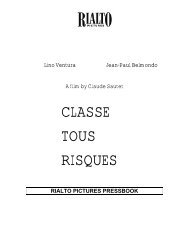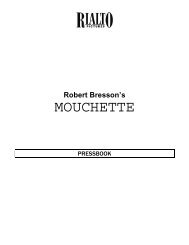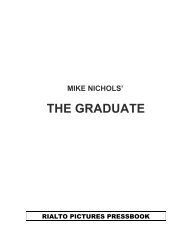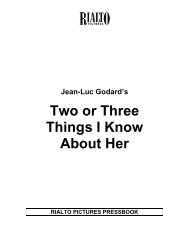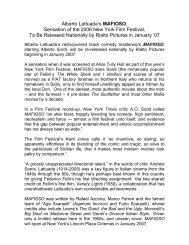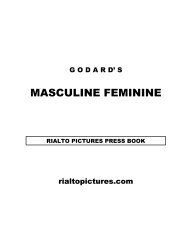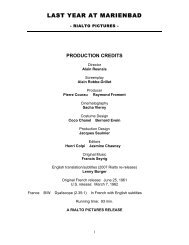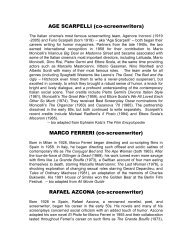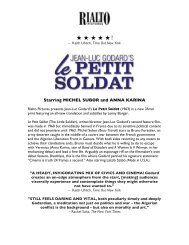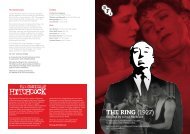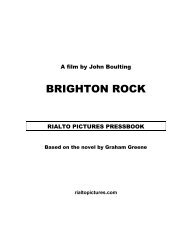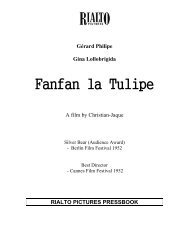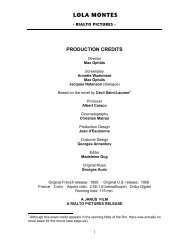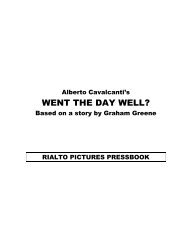Two or Three Things I Know About Her - Rialto Pictures
Two or Three Things I Know About Her - Rialto Pictures
Two or Three Things I Know About Her - Rialto Pictures
You also want an ePaper? Increase the reach of your titles
YUMPU automatically turns print PDFs into web optimized ePapers that Google loves.
James Monaco on “<strong>Two</strong> <strong>or</strong> <strong>Three</strong> <strong>Things</strong>…”<br />
<strong>Two</strong> <strong>or</strong> <strong>Three</strong> <strong>Things</strong> I <strong>Know</strong> <strong>About</strong> <strong>Her</strong> may very well be Godard's most<br />
consummate film. It began with an article about prostitution in the new suburbs of<br />
Paris published in Le Nouvel Observateur. The "elle" of the title is Juliette<br />
(Marina Vlady), as well as Paris. "During the course of the film," Godard<br />
explained, "I want to include everything; sp<strong>or</strong>t, politics, even groceries." This is<br />
Godard at his best, jostling images and sounds, w<strong>or</strong>ds and meaning, in a<br />
symphony of ideas: Juliette, the victim of the Paris suburban housing complex,<br />
the war in Vietnam, the poetry of consumer goods, the French fascination with<br />
America, the exploitation of women, her own indifference. . . .<br />
<strong>Two</strong> of the imp<strong>or</strong>tant scenes of the film take place in cafés, as do so many key<br />
scenes in Godard. In one there's a series of quick shots, each one a closer<br />
enlargement of a coffee cup until finally the cup fills the center of the scope<br />
image.<br />
We hear Godard on the soundtrack: "Perhaps an object like this will make it<br />
possible to link up, to move from one subject to another, from living in society, to<br />
being together. But then, since social relationships are always ambiguous, since<br />
my thought is only a unit, since an immense moat separates the subjective<br />
certitude that I have f<strong>or</strong> myself from the objective truth that I am f<strong>or</strong> others, since I<br />
never stop finding myself guilty, even though I feel innocent, since every event<br />
transf<strong>or</strong>ms my daily life, since I always seem to fail to communicate . . . since...<br />
since . . . since I can't tear myself away from the objectivity that crushes me, n<strong>or</strong><br />
from the subjectivity that isolates me, since it isn't possible f<strong>or</strong> me either to raise<br />
myself into Being, <strong>or</strong> to fall into Nothingness . . . , it's necessary that I listen, it's<br />
necessary that I look around me m<strong>or</strong>e than ever . . . the w<strong>or</strong>ld . . . my fellow<br />
creatures . . . my brothers."<br />
This is not a film talking. It is a man. It's the most personal moment in all of<br />
Godard. Poets sometimes speak to us directly but filmmakers seldom do.<br />
Throughout this long monologue shimmering black coffee swirls in the cup. The<br />
spoon stirs the sugar. The sharp light refracts in the bubbles that f<strong>or</strong>m, turn<br />
slowly, slowly on the surface, and then annihilate themselves. Godard is a great<br />
filmmaker because he makes great cinema out of a close-up of a coffee cup and<br />
a narrative of his own thoughts about his own feelings.<br />
<strong>Two</strong> <strong>or</strong> <strong>Three</strong> <strong>Things</strong> I <strong>Know</strong> <strong>About</strong> <strong>Her</strong> won the Prix Marilyn Monroe du Cinéma,<br />
awarded by an all-woman jury including Marguerite Duras and Fl<strong>or</strong>ence Malraux.<br />
-- excerpted from Godard entry in W<strong>or</strong>ld Film Direct<strong>or</strong>s – Volume <strong>Two</strong>, Edited by<br />
John Wakeman (1988, H. W. Wilson Company)<br />
7



